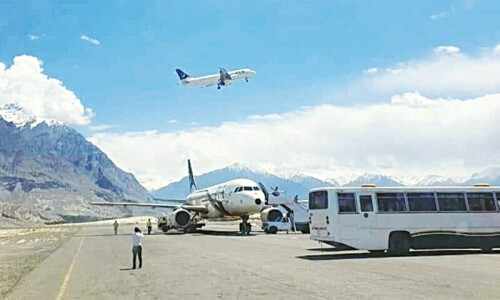 After deregulating diesel imports, Pakistan has moved closer to a full circle in freeing the oil trade from the official controls. However whether or not consumers will benefit from the open market competition among the marketing giants will be known during the first quarter of the free trade.
After deregulating diesel imports, Pakistan has moved closer to a full circle in freeing the oil trade from the official controls. However whether or not consumers will benefit from the open market competition among the marketing giants will be known during the first quarter of the free trade.
But the post-deregulation upward price revision ranging from two to four per cent by the oil marketing companies reflects that they are guided by the international prices rather than by local market demand and consumers’ concern about cost-push impact on production lines.
However, the general view is that there could be competitive prices at the selling outlets after the initial euphoria caused by the deregulation fades.
Already, the management of the Shell Pakistan has launched a campaign to sell the idea of quality products and competitive prices at its various selling outlets and others are bound to follow in subsequent weeks.
“In a free market economy it is difficult to keep the hold on selling prices,without forming a cartel”, an oil expert claims, adding that “the ground realities and counter-market forces prove a decisive factor in setting the spot prices”.
But some others said, having a massive resource base and control on the oil business from exploration, refining and marketing, some of the foreign giants could form a cartel but PSO as a state entity and counter-balance force could play a positive role in restoring balance to selling prices.
“Privatization of the PSO and the deregulation of the oil trade may not go together if a possible threat of price manipulation or cartel formation is to be eliminated”, says an oil dealer, adding that “the consumer interest will only be served if the PSO is there as a neutralizing entity”.
Beyond the oil selling outlets, the stock exchange tells a different story where prices of oil giants and, in sympathy, of the entire energy sector are witnessing a post-deregulation boom. Investors have virtually flooded this sector to have a stake in them both for capital appreciation and higher dividend.
The general perception is that consumers could be the chief beneficiaries in the final analysis as the oil giants have both an immense spending capacity on their publicity campaign and the resources to lower prices to outwit their immediate competitors.
The new system will take quite sometime to get consumer acceptance and there could be some awkward situations in-between, threatening the very basis of the deregulation policy, oil dealers said.
The government has already set broad outlines to fix selling prices on fortnightly basis for the oil marketing companies for their retail outlets. But how the system will work at the private sector level is not clear at this stage.
Under the mutually agreed pricing formula,company margins will remain fixed at 3.5 per cent of the ex-depot price and that of dealers at four per cent.
While fixing prices at the retailers’ end, petroleum development levy, inland freight equalisation margin and sales tax at the rate of 15 per cent will also be included,unlike the previous uniform prices throughout the country. Prices now will differ from area-to-area but not more than 10 paisa or slightly above depending on the distant from the port to the farthest outlet of the country.
Pakistan’s total annual import of petroleum products is close to 18 million tonnes, out of which diesel alone accounts for 7 million tonnes and its deregulation will cover the largest sector of the economy.
“The switch-over from decades-old fixed price system to a free market economy is a momentous event and may be fraught with high risks,but its smooth functioning could benefit both the seller and the consumer”, an official of the oil company said.
The deregulation of the petroleum sector, which consumes one-third of the total foreign exchange each year or about $3 billion may not put the trade imbalance in the surplus,will certainly provide a breathing space for the official spending on this head.
















































Dear visitor, the comments section is undergoing an overhaul and will return soon.